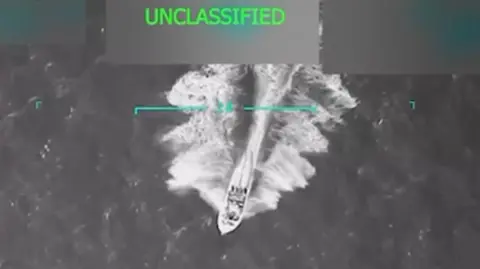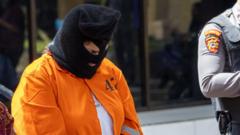The text message came from Dubai with a Santa emoji. OK lads. No need for luck. Really this couldn't be any more straightforward. Just relax and this will all be over soon. It was sent to a fisherman from Ukraine and an unemployed man from Teesside who were sailing to the middle of the Irish Sea to collect cocaine from a passing cargo ship, the MV Matthew.
As it turned out, they needed plenty of luck and very little was straightforward.
The two men were part of an audacious attempt to traffic more than 2.2 tonnes of cocaine into the UK and Europe. It ended in failure, with a successful strike against the powerful drug cartels by the Irish authorities.
Eight men were convicted and jailed for a total of 129 years. All of the cocaine was destroyed.
But despite this result, law enforcement agencies across Europe admit they are struggling to stop the growing quantity of cocaine crossing the Atlantic from South America.
The Maritime Analysis Operations Centre (MAOC), which polices the transatlantic drug trade, says 100 ships suspected of trafficking drugs to Europe were not stopped last year because the authorities didn't have enough vessels to intercept them.
We have the intelligence of the vessel that's crossing the Atlantic... that it's loaded at that time, and still we don't have the interception assets available, its director, Sjoerd Top, tells Panorama.
Up to 600 vessels are monitored by MAOC each day, while record amounts of cocaine are being produced in South America, he adds.
UK users consumed 117 tonnes of cocaine last year, the UK's National Crime Agency reported. The number of cocaine-related deaths has risen ten-fold since 2011.
The drug is usually shipped in large container ships to European ports like Rotterdam and Antwerp. But security has been tightened there, so smugglers are looking for alternative routes. Many are now using at-sea drop-off methods, unloading bales of cocaine from a mother vessel to be picked up by a smaller daughter craft and taken to shore.
Ireland has almost 2,000 miles of coastline, much of it ideal for smuggling, with many hundreds of isolated inlets. The country's defence forces help combat the cartels, but face challenges due to low spending and limited resources.
The recent bust, while a success for the Irish government, has revealed alarming gaps in defense strategies against the increasing influx of narcotics.
As the operation highlights the relentless pursuit by drug trafficking organizations, experts warn that the vulnerabilities in maritime control must be addressed to enhance safety across Europe.
As it turned out, they needed plenty of luck and very little was straightforward.
The two men were part of an audacious attempt to traffic more than 2.2 tonnes of cocaine into the UK and Europe. It ended in failure, with a successful strike against the powerful drug cartels by the Irish authorities.
Eight men were convicted and jailed for a total of 129 years. All of the cocaine was destroyed.
But despite this result, law enforcement agencies across Europe admit they are struggling to stop the growing quantity of cocaine crossing the Atlantic from South America.
The Maritime Analysis Operations Centre (MAOC), which polices the transatlantic drug trade, says 100 ships suspected of trafficking drugs to Europe were not stopped last year because the authorities didn't have enough vessels to intercept them.
We have the intelligence of the vessel that's crossing the Atlantic... that it's loaded at that time, and still we don't have the interception assets available, its director, Sjoerd Top, tells Panorama.
Up to 600 vessels are monitored by MAOC each day, while record amounts of cocaine are being produced in South America, he adds.
UK users consumed 117 tonnes of cocaine last year, the UK's National Crime Agency reported. The number of cocaine-related deaths has risen ten-fold since 2011.
The drug is usually shipped in large container ships to European ports like Rotterdam and Antwerp. But security has been tightened there, so smugglers are looking for alternative routes. Many are now using at-sea drop-off methods, unloading bales of cocaine from a mother vessel to be picked up by a smaller daughter craft and taken to shore.
Ireland has almost 2,000 miles of coastline, much of it ideal for smuggling, with many hundreds of isolated inlets. The country's defence forces help combat the cartels, but face challenges due to low spending and limited resources.
The recent bust, while a success for the Irish government, has revealed alarming gaps in defense strategies against the increasing influx of narcotics.
As the operation highlights the relentless pursuit by drug trafficking organizations, experts warn that the vulnerabilities in maritime control must be addressed to enhance safety across Europe.

















